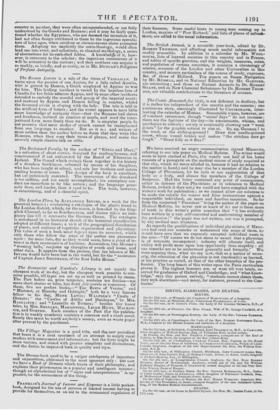We have received an angry communication signed Marncus, referring to
our late paper on Medical Reform. The writer would seem to have studied at Paris, (for nearly one half of his letter consists of a panegyric on the medical course of study required at that city, which we never alluded to, because it had no relation to the matter in hand,) and he may also be a member of the London College of Physicians, for he rails at our appreciation of' that body as a body, and abuses the members of the College of Surgeons. Had the letter contained any point of consequence, either in defence of the Physicians or in reference to Medical Reform, (which it does not,) we could not have complied with the writer's wish for publication ; as we cannot allow our columns to be made the vehicle for coarse and false insinuations against a respectable individual, on mere and baseless suspicion. So far from the suspected" President" being the author of the paper on Medical Reform, he never saw or knew of it: nor is there more of truth in this writer's polite assertion that "it has evidently been written by a very self-conceited and undermining member of the profession;" the paper was not written, nor was it prompted, by any medical man whatever. As regards the qualifications of individual physicians, if MEDI- CUS had read our remarks or understood the scope of them, he would have seen that we expressly excepted individual cases in the note—" Of course we do not mean to assert that a physician is of necessity incompetent : industry will educate itself, and ability will profit more upon less opportunity than stupidity : all our remarks are to be understood generally and formally." We were arguing then, what we say now, that as a matter of neces- sity, the education of the physician is not (medically) so learned, or his practice so varied, as that of the other branches of the pro- fession. The long boasts of this writer upon the Paris curriculum proves it. The highest honours are, or were till very lately, re- served for graduates of Oxford and Cambridge; and "what know- ledge,' says this person naively, "students cannot obtain there, they seek elsewhere—and many, for instance, proceed to the Con- tinent."


























 Previous page
Previous page